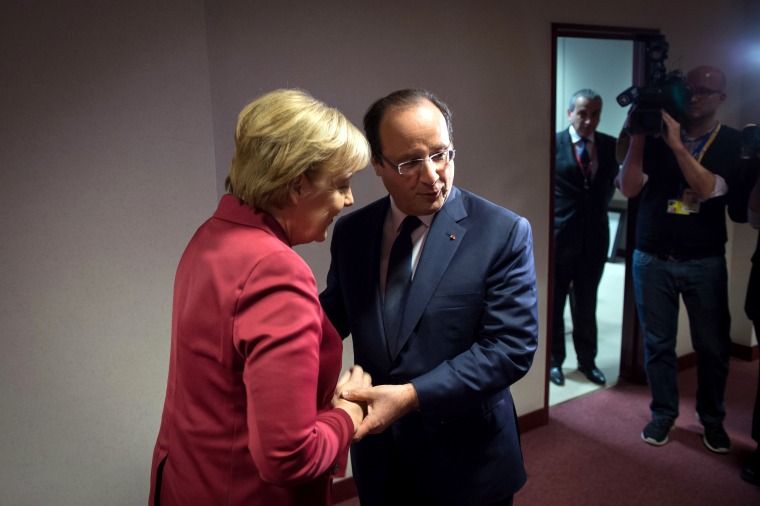Updated 2:05 p.m.:
The White House will meet with German officials in the coming weeks to discuss allegations that the U.S. spied on world leaders, NCS Spokesperson Caitlin Hayden said Friday.
German Chancellor Angela Merkel accused the U.S. this week of tapping her cell phone after she saw the number written on U.S. documents.
Days earlier, the French newspaper Le Monde reported that the National Security Agency culled more than 70 million phone records of French citizens over 30 days.
And a classified document from 2006 leaked by fugitive former NSA contractor Edward Snowden revealed that the NSA tracked the phone conversations of 35 world leaders and solicited the phone numbers from officials inside the White House, State Department, and Pentagon. One unnamed U.S. official shared 200 numbers, including those of 35 world leaders, according to the document.
The diplomatic fallout from yet another Snowden disclosure rocked day one of the European Council summit in Brussels Thursday, where the leaders ally nations voiced outrage over the spying allegations.
"We need to have trust in our allies and partners, and this must now be established once again. I repeat that spying among friends is not at all acceptable against anyone, and that goes for every citizen in Germany," Merkel said.
Hollande and Merkel announced in a joint appearance that "we will start discussing the matter with the Americans in order to agree upon a common framework, that will be done by the end of the year, and the other Europeans who would like to join us will be welcome."
"To be more specific, we will make sure that between the various services, we can not only clarify what happened in the past, but we can agree upon rules for the future," Hollande said.
They are jointly pushing for the U.S. to sign on to a "no-spying" pledge by the end of the year.
President Obama spoke by phone with both leaders this week. “The United States is not monitoring and will not monitor the communications of Chancellor Merkel” according to a White House readout of the call. The statement did not account for past actions, nor did White House Press Secretary Jay Carney in Thursday’s daily briefing.
“Some [of the recent disclosures] have distorted our activities and some… raise legitimate questions for our friends and allies about how these capabilities are employed,” the White House said in a call readout of Obama's phone conversation with French President Francois Hollande.
The assistant to the president for homeland security and counterterrorism, Lisa Monaco, defended the U.S. surveillance activities in a USA Today op-ed Friday: “We want to ensure that we are collecting information because we need it and not just because we can.” According to Monaco, a review group and oversight board have been crated “to ensure that privacy and civil liberties are appropriately protected.”
A report published in Britain’s Guardian newspaper Thursday revealed that the U.S. monitored the phone conversations of 35 world leaders, heightening tensions over the U.S. spying program, which earlier this year caused a standoff with the leaders of Mexico and Brazil. Brazilian President Dilma Rousseff declined an invitation to Washington and a State Dinner in her honor over the spying allegations.
